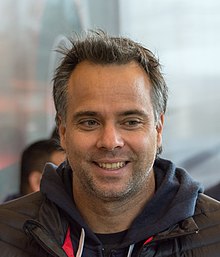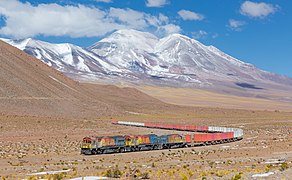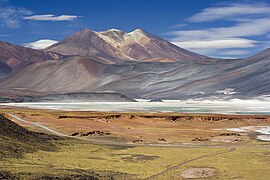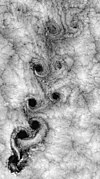Portal:Chile
| Main page | Assessment | Articles | Templates | Translation | Noticeboard | To Do List | Portal |
The Chile Portal

Chile, officially the Republic of Chile, is a country in western South America. It is the southernmost country in the world and the closest to Antarctica, stretching along a narrow strip of land between the Andes Mountains and the Pacific Ocean. With an area of 756,102 square kilometers (291,933 sq mi) and a population of 17.5 million as of 2017, Chile shares borders with Peru to the north, Bolivia to the northeast, Argentina to the east, and the Drake Passage to the south. The country also controls several Pacific islands, including Juan Fernández, Isla Salas y Gómez, Desventuradas, and Easter Island, and claims about 1,250,000 square kilometers (480,000 sq mi) of Antarctica as the Chilean Antarctic Territory. The capital and largest city of Chile is Santiago, and the national language is Spanish.
Spain conquered and colonized the region in the mid-16th century, replacing Inca rule, but failed to conquer the independent Mapuche people who inhabited what is now south-central Chile. Chile emerged as a relatively stable authoritarian republic in the 1830s after their 1818 declaration of independence from Spain. During the 19th century, Chile experienced significant economic and territorial growth, putting an end to Mapuche resistance in the 1880s and gaining its current northern territory in the War of the Pacific (1879–83) by defeating Peru and Bolivia. In the 20th century, up until the 1970s, Chile underwent a process of democratization and experienced rapid population growth and urbanization, while relying increasingly on exports from copper mining to support its economy. During the 1960s and 1970s, the country was marked by severe left-right political polarization and turmoil, which culminated in the 1973 Chilean coup d'état that overthrew Salvador Allende's democratically elected left-wing government. This was followed by a 16-year right-wing military dictatorship under Augusto Pinochet, which resulted in more than 3,000 deaths or disappearances. The regime ended in 1990, following a referendum in 1988, and was succeeded by a center-left coalition, which ruled until 2010.
Chile has a high-income economy and is one of the most economically and socially stable nations in South America, leading Latin America in competitiveness, per capita income, globalization, peace, and economic freedom. Chile also performs well in the region in terms of sustainability of the state and democratic development, and boasts the second lowest homicide rate in the Americas, following only Canada. Chile is a founding member of the United Nations, the Community of Latin American and Caribbean States (CELAC), and the Pacific Alliance, and joined the OECD in 2010. (Full article...)

John Thomas North (30 January 1842 – 5 May 1896) was an English investor and businessman. North was born in Leeds, Yorkshire, the son of a coal merchant and a churchwarden. At the age of fifteen he was apprenticed to millwrights and engineers before working for several years as a mechanic. He moved to Chile where his first occupation was as a boiler riveter in Huasco. He later moved to the Chilean town of Iquique where he worked as a waterworks operator, importer and ship owner. The War of the Pacific (1879–1883) provided North with an opportunity to purchase large numbers of bonds in the Peruvian nitrate industry. When Chile annexed Iquique and the surrounding province of Tarapacá the Chilean government transferred ownership of the nitrate fields to the bondholders. North was thus able to take a monopoly share of the lucrative Chilean nitrate industry for a very small initial investment, becoming known as "The Nitrate King".
North built upon his nitrates business by expanding into further monopolies in waterworks and freight railways, but also owned several iron and coal fields. North maintained his monopolies by employing lawyers to block competing entrepreneurs both in court and the Chilean National Congress. This was allowed by Chilean president Domingo Santa María, but Santa María's successor, José Manuel Balmaceda, became concerned that Tarapacá was starting to resemble a "state within a state" and resolved to break North's monopoly. Balmaceda had to force competition reforms through against opposition in congress, amongst a series of disputes which would eventually escalate into the 1891 Chilean Civil War between the president and the congress. (Full article...)Selected biography -
Selected article -
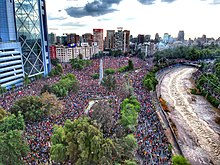
A series of massive demonstrations and severe riots, known in Chile as the Estallido Social (lit. social outburst), originated in Santiago and took place in all regions of Chile, with a greater impact in the regional capitals. The protests mainly occurred between October 2019 and March 2020, in response to a raise in the Santiago Metro's subway fare, a probity crisis, cost of living, university graduate unemployment, privatisation, and inequality prevalent in the country.
The protests began in Chile's capital, Santiago, as a coordinated fare evasion campaign by secondary school students which led to spontaneous takeovers of the city's main train stations and open confrontations with the Carabineros de Chile (the national police force). On 18 October, the situation escalated as a group of people began vandalizing Santiago's infrastructure; seizing, vandalizing, and burning down many stations of the Santiago Metro network and disabling them with extensive infrastructure damage; and for a time causing the closure of the network in its entirety. Eighty-one stations sustained major damage, including seventeen burned down. On the same day, President of Chile Sebastián Piñera announced a state of emergency, authorizing the deployment of Chilean Army forces across the main regions to enforce order and prevent the destruction of public property, and invoked before the courts the Ley de Seguridad del Estado ("State Security Law") against dozens of detainees. A curfew was declared on 19 October in the Greater Santiago area. (Full article...)General images
Did you know (auto generated)

- ... that Earle M. Chiles, a businessman and philanthropist from Portland, Oregon, was also a senator of the board of Ludwig Maximilian University in Munich, Germany?
- ... that the Chile Ridge has a slab window?
- ... that Peruvian foreign minister Manuel María Gálvez Egúsquiza was arrested by Chilean troops for refusing to sign peace with the cession of territory during the War of the Pacific?
- ... that Angelito de Canal 13, the mascot of the Chilean television network Canal 13, was inspired by its creator's son?
- ... that the Peruvian Civil Guard officer Mariano Santos Mateo was nicknamed the Brave Man of Tarapacá because he captured a banner of a Chilean military unit during the Battle of Tarapacá?
- ... that Salar de Pedernales in Chile features dark slope streaks resembling dark slope streaks on Mars?
Topics
Categories
Recognized content
| This is a list of recognized content, updated weekly by JL-Bot (talk · contribs) (typically on Saturdays). There is no need to edit the list yourself. If an article is missing from the list, make sure it is tagged (e.g. {{WikiProject Chile}}) or categorized correctly and wait for the next update. See WP:RECOG for configuration options. |
Featured articles
- Chilean battleship Almirante Latorre
- Almirante Latorre-class battleship
- Cerro Azul (Chile volcano)
- Calabozos
- El Tatio
- Chilean cruiser Esmeralda (1883)
- Guallatiri
- Laguna del Maule (volcano)
- Mothers of the Disappeared
- Ojos del Salado
- Pali-Aike volcanic field
- Pisco sour
- South American dreadnought race
- Taapaca
Good articles
- 2010 Pichilemu earthquakes
- 2018 Santiago ePrix
- Agustín Ross Cultural Centre
- Angata
- Los Ángeles Negros
- Apacheta-Aguilucho volcanic complex
- Argentine–Chilean naval arms race
- Atamu Tekena
- Orlando Bosch
- Lorenza Böttner
- Sara Braun
- Monte Burney
- Battle of Caldera Bay
- Felipe Camiroaga
- Chilean battleship Capitán Prat
- Carménère
- José María Caro Martínez
- Chile at the 2014 Winter Paralympics
- Coat of arms of Pichilemu
- Dutch expedition to Valdivia
- El Laco
- Milton Friedman
- Fueguino
- Mount Hudson
- Irruputuncu
- Laguna Miscanti
- Laguna del Negro Francisco
- Lascar (volcano)
- Lastarria
- Lazufre
- Licancabur
- Licancabur Lake
- Llullaillaco
- Nevado de Longaví
- Manuel Foster Observatory
- Monturaqui
- Irene Morales
- John Thomas North
- Obligation to Negotiate Access to the Pacific Ocean
- Olca-Paruma
- USS Oneota (1864)
- La Pacana
- Parinacota (volcano)
- Patio 29
- Pichilemu
- Colegio de la Preciosa Sangre de Pichilemu
- Salar de Punta Negra
- Reclus (volcano)
- Murders of María José Reyes and Juan Duarte
- Sammis Reyes
- Riro Kāinga
- Sairecabur
- Salar Ignorado
- San Pedro (Chile volcano)
- Socompa
- Sollipulli
- Tacora
- Tilocálar
- Nevado Tres Cruces
- Tupungatito
- Tuyajto Lake
Featured pictures
-
360-degree Panorama of the Southern Sky edit
-
A 360 degree panorama of a unique cloudscape over La Silla
-
Culpeo MC
-
FCAB EMD GT22CU-3 San Pedro - Ascotan
-
Laguna Miñiques, Chile, 2016-02-08, DD 33-38 PAN
-
Laser Towards Milky Ways Centre
-
Miscanti Lagoon near San Pedro de Atacama Chile Luca Galuzzi 2006
-
Moai Rano raraku
-
SQM GE 289A Boxcab Carmelita - Reverso
-
Volcán San Pedro, Chile, 2016-02-09, DD 18
-
Vortex-street-1
WikiProjects
Related portals
New articles
Rules | Match log | Results page (for watching) | Last updated: 2024-04-26 20:02 (UTC)
Note: The list display can now be customized by each user. See List display personalization for details.
- East Patagonia, Tierra del Fuego and Strait of Magellan Dispute (edit | talk | history | links | watch | logs | tools) by Janitoalevic (talk · contribs · new pages (7)) started on 2024-04-26, score: 63
- 2021 South American Badminton Championships (edit | talk | history | links | watch | logs | tools) by Fanminton (talk · contribs · new pages (18)) started on 2024-04-26, score: 14
- Damián González (edit | talk | history | links | watch | logs | tools) by ImSnot (talk · contribs · new pages (34)) started on 2024-04-26, score: 55
- Roberto Izurieta (edit | talk | history | links | watch | logs | tools) by Lmpesantezt (talk · contribs · new pages (4)) started on 2024-04-26, score: 16
- Nicolás Olivera (footballer, born 1993) (edit | talk | history | links | watch | logs | tools) by ImSnot (talk · contribs · new pages (34)) started on 2024-04-25, score: 43
- Nelson Da Silva (Argentine footballer) (edit | talk | history | links | watch | logs | tools) by ImSnot (talk · contribs · new pages (34)) started on 2024-04-25, score: 23
- Museo de la Solidaridad Salvador Allende (edit | talk | history | links | watch | logs | tools) by TomasVial (talk · contribs · new pages (1)) started on 2024-04-25, score: 49
- 2022 South American Badminton Championships (edit | talk | history | links | watch | logs | tools) by Fanminton (talk · contribs · new pages (18)) started on 2024-04-25, score: 22
- 2023 South American Badminton Championships (edit | talk | history | links | watch | logs | tools) by Fanminton (talk · contribs · new pages (18)) started on 2024-04-25, score: 28
- Bernardo Timmermann (edit | talk | history | links | watch | logs | tools) by Monteaguilino1 (talk · contribs · new pages (1)) started on 2024-04-25, score: 77
- Foreigners Everywhere (edit | talk | history | links | watch | logs | tools) by Czar (talk · contribs · new pages (8)) started on 2024-04-23, score: 24
- Manuela Zoccali (edit | talk | history | links | watch | logs | tools) by David Eppstein (talk · contribs · new pages (20)) started on 2024-04-24, score: 43
- Alliance Against Depression (edit | talk | history | links | watch | logs | tools) by Salopian75 (talk · contribs · new pages (1)) started on 2024-04-24, score: 16
- Fernando Moreyra (edit | talk | history | links | watch | logs | tools) by ImSnot (talk · contribs · new pages (34)) started on 2024-04-24, score: 23
- Matías Tellechea (edit | talk | history | links | watch | logs | tools) by ImSnot (talk · contribs · new pages (34)) started on 2024-04-24, score: 23
- Carlos Miró-Quesada Laos (edit | talk | history | links | watch | logs | tools) by AlejandroFC (talk · contribs · new pages (53)) started on 2024-04-23, score: 23
- Uriel Canjura (edit | talk | history | links | watch | logs | tools) by Zoglophie (talk · contribs · new pages (7)) started on 2024-04-22, score: 20
- Mauro Siergiejuk (edit | talk | history | links | watch | logs | tools) by ImSnot (talk · contribs · new pages (34)) started on 2024-04-22, score: 23
- Franco Olego (edit | talk | history | links | watch | logs | tools) by ImSnot (talk · contribs · new pages (34)) started on 2024-04-22, score: 55
- Carex molinae (edit | talk | history | links | watch | logs | tools) by Hughesdarren (talk · contribs · new pages (6)) started on 2024-04-21, score: 31
- Albano Becica (edit | talk | history | links | watch | logs | tools) by ImSnot (talk · contribs · new pages (34)) started on 2024-04-21, score: 35
- Onffroy de Verez family (edit | talk | history | links | watch | logs | tools) by Alenglin (talk · contribs · new pages (4)) started on 2024-04-20, score: 20
- 2024 Challenger Concepción (edit | talk | history | links | watch | logs | tools) by Adamtt9 (talk · contribs · new pages (42)) started on 2024-04-19, score: 43
- Canal 13 (Chilean TV network) (edit | talk | history | links | watch | logs | tools) by FrederickEvans (talk · contribs · new pages (25)) started on 2024-04-19, score: 91
- Roberto Hernández (Uruguayan footballer) (edit | talk | history | links | watch | logs | tools) by ImSnot (talk · contribs · new pages (34)) started on 2024-04-18, score: 23
- Al sur del corazón (edit | talk | history | links | watch | logs | tools) by Telenovelafan215 (talk · contribs · new pages (11)) started on 2024-04-18, score: 31
- Ángel Cayetano (edit | talk | history | links | watch | logs | tools) by ImSnot (talk · contribs · new pages (34)) started on 2024-04-17, score: 23
- Deaths in January 1988 (edit | talk | history | links | watch | logs | tools) by Mill 1 (talk · contribs · new pages (6)) started on 2024-04-17, score: 14
- Maximiliano Rueda (edit | talk | history | links | watch | logs | tools) by ImSnot (talk · contribs · new pages (34)) started on 2024-04-17, score: 23
- Metharme lanata (edit | talk | history | links | watch | logs | tools) by Tom Radulovich (talk · contribs · new pages (133)) started on 2024-04-17, score: 31
- Franco García (edit | talk | history | links | watch | logs | tools) by ImSnot (talk · contribs · new pages (34)) started on 2024-04-16, score: 23
- Guillermo Kuschel (edit | talk | history | links | watch | logs | tools) by Avocadobabygirl (talk · contribs · new pages (4)) started on 2024-04-16, score: 31
- Ezequiel Naya (edit | talk | history | links | watch | logs | tools) by ImSnot (talk · contribs · new pages (34)) started on 2024-04-16, score: 23
- Franco Torres (edit | talk | history | links | watch | logs | tools) by ImSnot (talk · contribs · new pages (34)) started on 2024-04-16, score: 23
- January 1978 (edit | talk | history | links | watch | logs | tools) by Mandsford (talk · contribs · new pages (2)) started on 2024-04-16, score: 14
- Álvaro Cazula (edit | talk | history | links | watch | logs | tools) by ImSnot (talk · contribs · new pages (34)) started on 2024-04-16, score: 23
- Lucas Abascia (edit | talk | history | links | watch | logs | tools) by ImSnot (talk · contribs · new pages (34)) started on 2024-04-16, score: 23
- Thomas Gillier (edit | talk | history | links | watch | logs | tools) by Xelo16 (talk · contribs · new pages (1)) started on 2024-04-16, score: 37
- Marco Campagnaro (edit | talk | history | links | watch | logs | tools) by ImSnot (talk · contribs · new pages (34)) started on 2024-04-16, score: 23
- Cristián Aspillaga (edit | talk | history | links | watch | logs | tools) by Pietaster (talk · contribs · new pages (35)) started on 2024-04-16, score: 31
- Facundo Krüger (edit | talk | history | links | watch | logs | tools) by ImSnot (talk · contribs · new pages (34)) started on 2024-04-16, score: 43
- Claudio Vicuña Subercaseaux (edit | talk | history | links | watch | logs | tools) by Kapollajdi (talk · contribs · new pages (1)) started on 2024-04-16, score: 49
- Bruno Pérez (edit | talk | history | links | watch | logs | tools) by ImSnot (talk · contribs · new pages (34)) started on 2024-04-16, score: 43
- Dignitas Infinita (edit | talk | history | links | watch | logs | tools) by MikeCongo (talk · contribs · new pages (0)) started on 2024-04-09, score: 14
- Enzo Hoyos (edit | talk | history | links | watch | logs | tools) by ImSnot (talk · contribs · new pages (34)) started on 2024-04-15, score: 35
- Lázaro Romero (edit | talk | history | links | watch | logs | tools) by ImSnot (talk · contribs · new pages (34)) started on 2024-04-15, score: 23
- Carmen Bezanilla (edit | talk | history | links | watch | logs | tools) by Pietaster (talk · contribs · new pages (35)) started on 2024-04-15, score: 31
- Río Trongol (edit | talk | history | links | watch | logs | tools) by Ensconced and warmed up (talk · contribs · new pages (2)) started on 2024-04-15, score: 32
- Quemados case (edit | talk | history | links | watch | logs | tools) by Michalis Vazaios (talk · contribs · new pages (1)) started on 2024-04-15, score: 55
- Maximiliano Rodríguez (footballer, born 1999) (edit | talk | history | links | watch | logs | tools) by ImSnot (talk · contribs · new pages (34)) started on 2024-04-15, score: 35
- Gustavo Guerreño (edit | talk | history | links | watch | logs | tools) by ImSnot (talk · contribs · new pages (34)) started on 2024-04-15, score: 43
- Sudamérica XV (edit | talk | history | links | watch | logs | tools) by Fma12 (talk · contribs · new pages (1)) started on 2024-04-15, score: 14
- Germán Estigarribia (edit | talk | history | links | watch | logs | tools) by ImSnot (talk · contribs · new pages (34)) started on 2024-04-14, score: 63
- Federico Martin (edit | talk | history | links | watch | logs | tools) by ImSnot (talk · contribs · new pages (34)) started on 2024-04-14, score: 23
- Gata Only (edit | talk | history | links | watch | logs | tools) by Floppykart (talk · contribs · new pages (9)) started on 2024-04-12, score: 23
- Choro (song) (edit | talk | history | links | watch | logs | tools) by FanDePopLatino (talk · contribs · new pages (1)) started on 2024-04-14, score: 16
- Volleyball at the 2024 Bolivarian Youth Games (edit | talk | history | links | watch | logs | tools) by Thiago89 (talk · contribs · new pages (8)) started on 2024-04-14, score: 16
- Carex lamprocarpa (edit | talk | history | links | watch | logs | tools) by Hughesdarren (talk · contribs · new pages (6)) started on 2024-04-14, score: 31
- Carlos Cortés (edit | talk | history | links | watch | logs | tools) by ImSnot (talk · contribs · new pages (34)) started on 2024-04-14, score: 35
- Carex andina (edit | talk | history | links | watch | logs | tools) by Hughesdarren (talk · contribs · new pages (6)) started on 2024-04-13, score: 31
- Joaquín Pereyra (centre-back footballer) (edit | talk | history | links | watch | logs | tools) by ImSnot (talk · contribs · new pages (34)) started on 2024-04-13, score: 23
- Joaquín Pereyra (Uruguayan midfielder) (edit | talk | history | links | watch | logs | tools) by ImSnot (talk · contribs · new pages (34)) started on 2024-04-13, score: 35
- Andrés Barboza (edit | talk | history | links | watch | logs | tools) by ImSnot (talk · contribs · new pages (34)) started on 2024-04-13, score: 35
- Luis Guerra (edit | talk | history | links | watch | logs | tools) by ImSnot (talk · contribs · new pages (34)) started on 2024-04-12, score: 43
- Junior Marabel (edit | talk | history | links | watch | logs | tools) by ImSnot (talk · contribs · new pages (34)) started on 2024-04-12, score: 23
- Bruno Betancor (edit | talk | history | links | watch | logs | tools) by ImSnot (talk · contribs · new pages (34)) started on 2024-04-12, score: 23
- Caleta Chañaral (edit | talk | history | links | watch | logs | tools) by Ensconced and warmed up (talk · contribs · new pages (2)) started on 2024-04-12, score: 28
- Franco Frías (edit | talk | history | links | watch | logs | tools) by ImSnot (talk · contribs · new pages (34)) started on 2024-04-12, score: 23
Associated Wikimedia
The following Wikimedia Foundation sister projects provide more on this subject:
-
Commons
Free media repository -
Wikibooks
Free textbooks and manuals -
Wikidata
Free knowledge base -
Wikinews
Free-content news -
Wikiquote
Collection of quotations -
Wikisource
Free-content library -
Wikiversity
Free learning tools -
Wikivoyage
Free travel guide -
Wiktionary
Dictionary and thesaurus
